|
|
|
Sort Order |
|
|
|
Items / Page
|
|
|
|
|
|
|
| Srl | Item |
| 1 |
ID:
174229
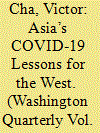

|
|
|
|
|
| Summary/Abstract |
Epidemiologists universally acknowledge that communities in Asia including in Hong Kong, Singapore, South Korea, Taiwan, and Vietnam have been more successful than the United States and most European countries in “flattening the curve” and limiting the spread of the COVID-19 virus among its populations. Despite the relative proximity of human-to-human transmission with China, the total number of cases and deaths as of May 2020 for these five countries is unusually small compared to the United States, Italy, and other European states. South Korea discovered its first positive case within one day of the United States but slowed the infection rate by the end of February. The United States, by contrast, exceeded 1.1 million cases and was still on the incline in late April. Singapore has demonstrated the lowest mortality rate for the virus and succeeded in initially suppressing infection rates with quarantines and social distancing. And all these Asian societies have managed to maintain some degree of normalcy and economic well-being compared with the lockdown and economic freefall in the United States.
|
|
|
|
|
|
|
|
|
|
|
|
|
|
|
|
| 2 |
ID:
197197


|
|
|
|
|
| Summary/Abstract |
A confluence of forces over the past year have increased the likelihood of militarised conflict on the Korean Peninsula. North Korea, emboldened by a new partnership with Russia and ongoing support from China, has embarked on a series of provocations while rejecting repeated US offers of dialogue. Inter-Korean tensions have also spiked due to the recasting of long-standing unification policies on both sides and Pyongyang’s bizarre balloon offensive. Given North Korea’s dismal domestic situation, exacerbated by its harsh three-year COVID-19 lockdown, the regime could stoke external conflict to distract its population. US election years are historically periods of heightened North Korean belligerence, and therefore further rounds of escalation are likely in the coming months. The US and its regional allies should focus on upholding deterrence and weakening the North Korea–China–Russia axis, while pursuing initiatives to alleviate the suffering of ordinary North Koreans.
|
|
|
|
|
|
|
|
|
|
|
|
|
|
|
|
| 3 |
ID:
170911
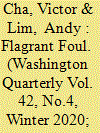

|
|
|
| 4 |
ID:
122018
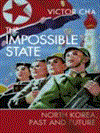

|
|
|
|
|
| Publication |
London, Bodley Head, 2012.
|
| Description |
530p.Pbk
|
| Standard Number |
9781847922366
|
|
|
|
|
|
|
|
|
|
|
|
Copies: C:1/I:0,R:0,Q:0
Circulation
| Accession# | Call# | Current Location | Status | Policy | Location |
| 057375 | 951.93/CHA 057375 | Main | On Shelf | General | |
|
|
|
|
| 5 |
ID:
155466
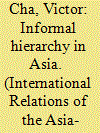

|
|
|
|
|
| Summary/Abstract |
The U.S.-based alliance system in Asia has grown stronger since the end of the Cold War, not weaker. Indeed, Japan and the Republic of Korea each celebrated in recent years the 60th anniversary of their alliances with the United States with proclamations of continued resiliency and longevity. Why is this? How do great powers maximize their influence in regional security? Some might argue that the threat of a rising China provides the glue to the alliances’ longevity. But no country in the region is really looking to balance China as the raison d’ȇtre of their security relationship with America. I argue the San Francisco system’s durability today is found in the unique origins of the hub and spokes alliance system. The United States operationalized a strategy of ‘tight bilateralism’ that maximized power through the creation of formal networks and informal hierarchy in Asia. It established a formal network of alliances to deter the communist threat, but also to exercise control over these newfound allies. The United States had bilateral relationships in Europe, where it transacted business through deep bilateral ties, as well as through a regional organization; moreover, some multilateral coordination among the member states was encouraged. This was less the case in Asia. Instead, a ‘hub and spokes’ arrangement emerged in which all parties in the network were plugged into a central hub, but with almost no interaction among them. This formal hub and spokes network operated as an informal hierarchical arrangement with Taiwan, South Korea, Japan, and others that maximized U.S. power. Moreover, the arrangement was legitimized domestically in all of the member states. This structure and process contributed greatly to the bilateral alliance arrangement’s continuing durability, even today. In this article, I focus on Japan as the primary example of this hierarchy strategy of ‘tight bilateralism’ at work.
|
|
|
|
|
|
|
|
|
|
|
|
|
|
|
|
| 6 |
ID:
099691


|
|
|
|
|
| Publication |
2010.
|
| Summary/Abstract |
Conventional wisdom argues that President Obama inherited a U.S. reputation that was badly damaged around the world. While this may hold true in Europe, in Asia, where U.S. standing matters most, there was never such a precipitous decline. To Europeans, the Iraq War stirred moral outrage and rabid opposition. However, the situation in the Persian Gulf simply did not matter as much to Asians. There were pockets within Asia that were critical of U.S. actions, but this was overshadowed by an overwhelming support for values such as democracy and human rights. Evidence shows that even vis-agrave-vis China, U.S. standing has not faced a significant decline in the region. The result is that Asians continue to perceive the United States as the closest thing to an honest broker in the region, as evidenced by positive reactions to the leadership role that the United States took in response to the 2004 tsunami. Representing 60 percent of the world's population, compared to Europe's seven percent, Asian views are probably most important for the future of the United States. Thus, President Obama has a solid base in Asia from which to build leadership and goodwill, but he must do so amidst the challenges of the global financial crisis and heightened expectations.
|
|
|
|
|
|
|
|
|
|
|
|
|
|
|
|
| 7 |
ID:
085048
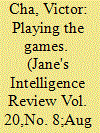

|
|
|
| 8 |
ID:
142785
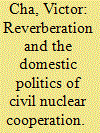

|
|
|
|
|
| Summary/Abstract |
Reverberation refers to the role that external domestic and international variables can play in shaping the win-set of a negotiation between two countries. These variables create political considerations, political mandates, and political constraint outside of the technical discussion that influence the negotiation. This article looks at the degree to which political variables “reverberated’ onto the 2015 civil nuclear agreement between the United States and the Republic of Korea (ROK), the end product of a four-and-a-half-year negotiation specifying the terms under which the ROK could use US-supplied technology and materials to pursue sovereign nuclear power generation and nuclear energy provision to third countries. It will argue that while the potential was high for this technical negotiation to become politicized in a domestic context in South Korea and potentially erode alliance relations, the two countries managed to keep the disagreements in the experts’ space, without negative reverberating effects on political leaders.
|
|
|
|
|
|
|
|
|
|
|
|
|
|
|
|
| 9 |
ID:
158870
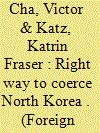

|
|
|
|
|
| Summary/Abstract |
When it comes to North Korea [1], U.S. President Donald Trump’s policies have been whiplash inducing. On February 23, he appeared to be gearing up for a conflict when he said that if sanctions against Pyongyang didn’t work, Washington would have to move to “phase two,” which could be “very, very unfortunate for the world.” But just two weeks later, Trump abruptly changed course and accepted an invitation to meet with North Korean leader Kim Jong Un—a decision that caught even his own White House and State Department by surprise.
|
|
|
|
|
|
|
|
|
|
|
|
|
|
|
|
| 10 |
ID:
165839
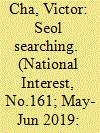

|
|
|
|
|
| Summary/Abstract |
The question naturally arises as to why the South Korean government is pursuing this declaration with such vigor, when it is a half-measure that won’t fundamentally alter the military balance, and it will not be accompanied by a final dismantlement of North Korea’s nuclear weapons threat.
|
|
|
|
|
|
|
|
|
|
|
|
|
|
|
|
| 11 |
ID:
113907
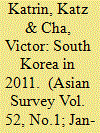

|
|
|
|
|
| Publication |
2012.
|
| Summary/Abstract |
The year 2011 saw South Korea deepen bilateral cooperation with the United States while building its status as a global player on the international stage. These developments were facilitated by broader regional dynamics-particularly with respect to Japan and China-that helped push Washington and Seoul closer together. Key issues with the potential to redirect South Korea's bilateral and global trajectories in the coming months include the Korea-U.S. Free Trade Agreement, the death of Kim Jong-il and policy toward North Korea, and election year politics in South Korea.
|
|
|
|
|
|
|
|
|
|
|
|
|
|
|
|
|
|
|
|
|